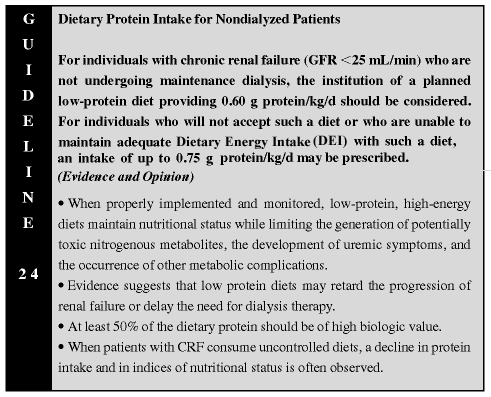

There are several potential advantages to prescribing a carefully designed low-protein diet (eg, about 0.60 g protein/kg/d) for the treatment of individuals with progressive CRF. Low-protein diets reduce the generation of nitrogenous wastes and inorganic ions, which cause many of the clinical and metabolic disturbances characteristic of uremia. Moreover, low-protein diets can diminish the ill effects of hyperphosphatemia, metabolic acidosis, hyperkalemia, and other electrolyte disorders. Although the main hypothesis of the Modification of Diet in Renal Disease Study was not proven,202 post hoc analyses indicated that low protein diets retarded the progression of renal failure.203,204 Three meta-analyses each indicate that such diets are associated with retardation of the progression of renal failure or a delay in the onset of renal replacement therapy.205-207 It is also possible that in patients with higher levels of GFR, possibly as great as 50 mL/min/1.73 m2, a planned low protein diet may retard progression of renal failure. There has been much confusion in the nephrology community regarding the collective results of these studies.
A decline in protein and energy intake and in indices of nutritional status have been documented in patients with a GFR below about 50 mL/min/1.73 m2 who have been consuming uncontrolled diets.196-198 Indeed, patients who are allowed to eat ad libitum diets may ingest inadequate energy and, occasionally, insufficient protein rather than too much. In contrast, both metabolic balance studies as well as clinical trials suggest that the preponderance of CRF patients ingesting a controlled low-protein diet providing 0.60 g protein/kg/d will maintain nutritional status,57,99,208-210 particularly if they receive higher energy intakes (ie, 35 kcal/kg/d).211
DPIs providing somewhat larger quantities of protein have been recommended based on the findings that adherence is easier with such diets and actual protein intakes of 0.75 g/kg/d or lower were all associated with similar rates of progression of renal failure in patients with a GFR of 25 mL/min/1.73 m2 or lower.203 Thus, for individuals who are unwilling or unable to ingest 0.60 g protein/kg/d or are unable to maintain adequate energy intakes with this dietary regimen, a diet providing up to 0.75 g protein/kg/d may be prescribed. Such diets must be carefully implemented by personnel with expertise and experience in dietary management (Appendix IV), and individuals prescribed such a diet must be carefully monitored (Guidelines 1 and 26 and Appendix III). Methods for measuring or estimating GFR are discussed in Appendix IX.